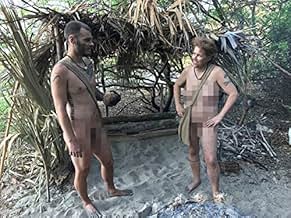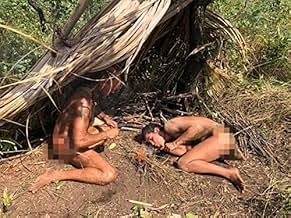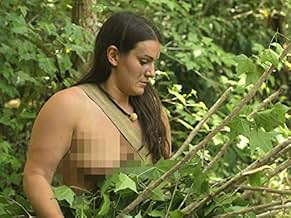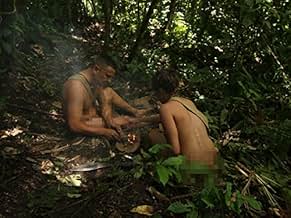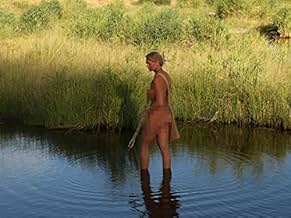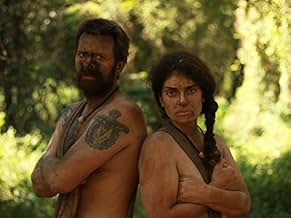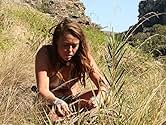Un reality show dove due sconosciuti (solitamente un uomo e una donna) cercano di sopravvivere nella natura selvaggia per 21 giorni, completamente nudi.Un reality show dove due sconosciuti (solitamente un uomo e una donna) cercano di sopravvivere nella natura selvaggia per 21 giorni, completamente nudi.Un reality show dove due sconosciuti (solitamente un uomo e una donna) cercano di sopravvivere nella natura selvaggia per 21 giorni, completamente nudi.
- Candidato a 4 Primetime Emmy
- 7 candidature totali
Sfoglia gli episodi
Recensioni in evidenza
I never watched this program until this year (2015) and I found myself "binge watching" most of the episodes over a couple of weekends. The show is like eating potato chips. You can't watch just one, so if you are DVR-ing, you will probably do what I did and watch perhaps four in a sitting. But I'm a skeptic, and when you watch a bunch of these in one sitting, certain patterns emerge. There's more to this show than meets the eye. In three of the episodes that I watched this weekend, someone conveniently finds an old metal pot, which is interesting because it doesn't make sense that a pot would just magically appear, like the holy grail, in the snake-infested muck of a Louisiana bayou, or in an alligator-infested river in Botswana? If you don't have access to potable water, you're not going to make it to 21 days and this is an expensive production. "Look at that! A pot! I can't believe it! Now we can boil water!" Also, it seems each person can only bring one tool for the trip, which in most cases is a knife and a fire starter. (Lol, how odd that they NEVER each bring the same thing, like, "Darn, I brought a fire starter too!! Now what are we going to do?") And while it is fun to see the scary animals lurking in the bushes, you will never see a shot of a lion or hyena in the same frame as the people. Hyenas are opportunistic feeders who select the easiest and most attractive food. Are you telling me that these two naked and unarmed humans would not be a tasty snack? How dangerous are these places, for real? Is there actually a resort a few yards away that you can't see? I mean, really, would the producers spend all that money on one episode, only to leave the participants in their little shelters at night, with no protection, and go back to their cozy campsite, only to return in the morning to find that they'd been devoured by a lion? I don't think so. I could pull off a version of this show in my own back yard, sit naked in a patch of trees between my house and my neighbor's for 21 days, digging a hole for water and catching termites, grasshoppers and squirrels to eat. You would never know my house was 20 feet in front of me. But I do like this show. In fact, I am giving it a 6 out of 10. In addition to being entertaining, it is educational and actually a fascinating concept. You can learn a lot about survival techniques from this show, and the scenery is beautiful. I just think you have to keep an open mind and take it for what it is, or isn't.
If you're looking for a show with a tight focus on bushcraft, and on the grittier details of what it takes to survive inhospitable conditions, Naked and Afraid may not be for you.
On the other hand, if you're looking for a bombastic gameshow about pretty people politicking to outlast one another on a deserted island, again, not for you.
Naked and Afraid lies somewhere in the middle of these concepts. There's quite a bit of social drama and some "gameshow" like feel, while survivalism methods are there, but given short shrift. Disclaimer: I've only watched the first season at this point.
It's probably true that in order to find a large enough mainstream audience, a show like this has to appeal to the "everyday person" who's more likely to respond to the social drama than the finer points of wilderness survival. Even on a channel such as Discovery. I don't mind the social drama, but I'd love just a little more on the latter.
I'm also curious about the making of the show itself. What sort of rules are there, filming in territories like these? How is waste dealt with? Can the survivalists just poop and pee anywhere? Are they doing any sort of bathing? What kind of hygiene practices are possible? To what extent are the survivalists tasked with their own photography? What's it like to have a camera crew show up each day and put a camera in your face? Does it make the experience feel surreal?
The editing of the footage seems to shape the social tension. The couple isn't getting along at first? But later there's a moment of reconciliation? Story arc!
It also manufactures environmental drama where it doesn't really exist. The tide is starting to come in while the group is on the beach? Quick -- intensify the music, insert a sound clip of someone's *censored* curse word, and cut to commercial!
What -- the wild boars the couple were afraid of never show up? How about the thorn in the bottom of that guy's foot -- can we see it again and again and again?
I know, it's a TV show, and you need to get people to stick around through the commercial breaks. But still.
One last gripe: the "PSR" -- Personal Survival Rating -- is half interesting concept, half obvious gimmick to give the viewer some simple concept to grasp. An overly simple metric. "Experience," "Skill," and "Mental." Wait -- Mental?? The first two words are nouns, but mental is an adjective. Anyway...
These pedantic criticisms aside, I've kept watching, and will continue to do so. Seeing people naked in these situations is especially engrossing. And while some of the social drama feels contrived, and while certain items mysterious appear that will help the contestants meet their needs (a battered sauce pot appears in a swamp perfect for boiling water; a long rod of bamboo washes up on a beach, perfect for constructing the raft needed to reach an extraction point on an island), it's nevertheless enthralling to watch people go through this. Part schadenfreude, maybe, but part compassion. Something is driving these individuals, something that seems less like exhibition or competitiveness, but some unresolved trauma.
Not all of them are there processing their demons, no. But Shane, from the first episode, clearly has unresolved trauma from being a foster child. He's acerbic and angry almost the entire time.
Forrest, on the other hand, from the "double jeopardy" episode (currently IMDb lists it as the final episode of season one, while on Prime it's the first of season two; at any rate, the most recent one I've watched) -- he seems like a genuine survival enthusiast eager to ply his skills.
In fact, Forrest wins, in my humble opinion, as one of the most capable survivalists. Joined perhaps by Billy, from the Louisiana episode.
For the women, that distinction has to go to Manu ("double jeopardy") and Ky Furneaux ("beware the bayou").
Oh, one last thing -- not all of the environments seem as inhospitable. The Maldives are hot and that dude gets braised like a chicken, but it's the Louisiana bayou, or maybe Panama, that feel like a whole other league. (Manu, I hope wherever you are, you've fully recovered...)
7/10.
On the other hand, if you're looking for a bombastic gameshow about pretty people politicking to outlast one another on a deserted island, again, not for you.
Naked and Afraid lies somewhere in the middle of these concepts. There's quite a bit of social drama and some "gameshow" like feel, while survivalism methods are there, but given short shrift. Disclaimer: I've only watched the first season at this point.
It's probably true that in order to find a large enough mainstream audience, a show like this has to appeal to the "everyday person" who's more likely to respond to the social drama than the finer points of wilderness survival. Even on a channel such as Discovery. I don't mind the social drama, but I'd love just a little more on the latter.
I'm also curious about the making of the show itself. What sort of rules are there, filming in territories like these? How is waste dealt with? Can the survivalists just poop and pee anywhere? Are they doing any sort of bathing? What kind of hygiene practices are possible? To what extent are the survivalists tasked with their own photography? What's it like to have a camera crew show up each day and put a camera in your face? Does it make the experience feel surreal?
The editing of the footage seems to shape the social tension. The couple isn't getting along at first? But later there's a moment of reconciliation? Story arc!
It also manufactures environmental drama where it doesn't really exist. The tide is starting to come in while the group is on the beach? Quick -- intensify the music, insert a sound clip of someone's *censored* curse word, and cut to commercial!
What -- the wild boars the couple were afraid of never show up? How about the thorn in the bottom of that guy's foot -- can we see it again and again and again?
I know, it's a TV show, and you need to get people to stick around through the commercial breaks. But still.
One last gripe: the "PSR" -- Personal Survival Rating -- is half interesting concept, half obvious gimmick to give the viewer some simple concept to grasp. An overly simple metric. "Experience," "Skill," and "Mental." Wait -- Mental?? The first two words are nouns, but mental is an adjective. Anyway...
These pedantic criticisms aside, I've kept watching, and will continue to do so. Seeing people naked in these situations is especially engrossing. And while some of the social drama feels contrived, and while certain items mysterious appear that will help the contestants meet their needs (a battered sauce pot appears in a swamp perfect for boiling water; a long rod of bamboo washes up on a beach, perfect for constructing the raft needed to reach an extraction point on an island), it's nevertheless enthralling to watch people go through this. Part schadenfreude, maybe, but part compassion. Something is driving these individuals, something that seems less like exhibition or competitiveness, but some unresolved trauma.
Not all of them are there processing their demons, no. But Shane, from the first episode, clearly has unresolved trauma from being a foster child. He's acerbic and angry almost the entire time.
Forrest, on the other hand, from the "double jeopardy" episode (currently IMDb lists it as the final episode of season one, while on Prime it's the first of season two; at any rate, the most recent one I've watched) -- he seems like a genuine survival enthusiast eager to ply his skills.
In fact, Forrest wins, in my humble opinion, as one of the most capable survivalists. Joined perhaps by Billy, from the Louisiana episode.
For the women, that distinction has to go to Manu ("double jeopardy") and Ky Furneaux ("beware the bayou").
Oh, one last thing -- not all of the environments seem as inhospitable. The Maldives are hot and that dude gets braised like a chicken, but it's the Louisiana bayou, or maybe Panama, that feel like a whole other league. (Manu, I hope wherever you are, you've fully recovered...)
7/10.
This show is about survival in the wild. Two unrelated contestants--one male, one female--are deposited in a natural setting where they try to survive for 21 days. Each person is permitted to bring one item with him (e.g. a machete), so it is not a truly unaided survival, but it is very close. There is little interference from the crew of the show.
I have watched three episodes so far. In each case, the environments were harsh. The hazards ranged from biting insects or wild boar to days of rain or shark-infested waters. So far, no one has had an easy time of it.
As you watch the show, it is impossible not to project yourself into the situation. This is a real, human drama that anyone could relate to.
Some viewers see gender politics in the show. It is natural to make comparisons between the partners, but it is more satisfying to view the contestants as individuals. Each is given a Primitive Survival Rating at the beginning of the show--based upon skills, experience and mental makeup--and their is no component for gender. At the end of the show, their ratings are updated, based upon new skills learned and the strengths and weaknesses revealed.
As we watch the show, we learn. Time (daylight) is a resource many do not measure. It must be used effectively. Other primary values are water, food and fire. The primitive environment is hostile. Even the sun can be an enemy. Each environment has its own set of threats--and that is one reason this show is interesting. Each team must evaluate its distinctive environment and quickly react to its threats and resources. In the early hours of each adventure, the smart survivalist benefits from a healthy dose of fear.
I have watched three episodes so far. In each case, the environments were harsh. The hazards ranged from biting insects or wild boar to days of rain or shark-infested waters. So far, no one has had an easy time of it.
As you watch the show, it is impossible not to project yourself into the situation. This is a real, human drama that anyone could relate to.
Some viewers see gender politics in the show. It is natural to make comparisons between the partners, but it is more satisfying to view the contestants as individuals. Each is given a Primitive Survival Rating at the beginning of the show--based upon skills, experience and mental makeup--and their is no component for gender. At the end of the show, their ratings are updated, based upon new skills learned and the strengths and weaknesses revealed.
As we watch the show, we learn. Time (daylight) is a resource many do not measure. It must be used effectively. Other primary values are water, food and fire. The primitive environment is hostile. Even the sun can be an enemy. Each environment has its own set of threats--and that is one reason this show is interesting. Each team must evaluate its distinctive environment and quickly react to its threats and resources. In the early hours of each adventure, the smart survivalist benefits from a healthy dose of fear.
I generally don't watch reality shows, but at the urging of a friend, tuned into this one with my wife, and got hooked. The premise is a man and a woman who don't know previously know each other are injected into a hostile or challenging environment with only a single tool of their choice each and with no clothes and must survive for 21 days. The challenges are (in the approximate order of criticality); get acquainted and establish a cooperative relationship; build a fire; acquire potable water; build a shelter; survive off native plants until you can acquire protein by fishing and hunting; avoid dangerous animals and exposure; be productive with your partner by emphasizing strengths and minimizing weaknesses. Then there is basically realizing that successful survivalism (i.e. surviving", means not making any mistakes (like letting your fire go out or burn down your shelter, or chopping your finger with a machete or drinking bad water and getting dysentery). Further, it helps to be lucky -- if possible avoid bad storms, flash floods, etc. If you like problem-solving; if you like the outdoors and have a respect for real nature; if you are fascinated by observing human nature under stress, you will probably enjoy this show. I've watched five programs to date, and quickly noticed the people selected are all "well-nourished" as coroners used to say -- not fat, but not thin. Every participant is faced with the huge challenge of trying to get enough calories to get by, and we quickly learn what a huge disadvantage most modern humans are at when they do not have tools or their culture to rely upon. The average weight loss among the ten people so far be roughly 30 lbs in 21 days, and it's easy to see the toll of stress and anxiety on the participants.
After nearly 14 years, the "Survivor" phenomenon has evolved into this - survival TV the way it should be. All the Bear Grylls copycats can hang their heads in shame. Real "reality TV" means real risks. "Naked and Afraid" delivers this in spades.
You know when reality TV is real - because it inevitably gets boring. Reality is often boring. In this show, this "ordinary-ness" is what makes it so interesting and infectious. None of this $100k prizes, voting out contestants, winning the things you need to live et al. And most important of all - No script, no make up and wardrobe or art departments!
Finally, Television takes on the clothing thing head on. Being American, this show dances with this topic by using the ubiquitous pixellation of private bits where the rest of the world wouldn't care and would just show it raw with the appropriate rating and warnings.
To it's credit, it handles the nudity very well. You almost don't recognize it's even there.
Just like "Survivor" broke new ground a decade ago, this program is definitely an original. No doubt it will spawn a rash of "me too" copycat programs around the world and behind this phenomenon, an industry of tourism operators eager to give viewers a taste of the "real thing".
Best of all, "Naked and Afraid" makes nudism cool and fun again. Not since the '70s have we been so challenged to lose our clothes and join our friends on the box.
My hat (and everything else) is off to the producers for daring to do something original in a world where so little originality is left. See if you can rise to the challenge of releasing an "uncensored" version though for the rest of the world to watch - before the rest of the world starts to make their own anyway.
ZM
You know when reality TV is real - because it inevitably gets boring. Reality is often boring. In this show, this "ordinary-ness" is what makes it so interesting and infectious. None of this $100k prizes, voting out contestants, winning the things you need to live et al. And most important of all - No script, no make up and wardrobe or art departments!
Finally, Television takes on the clothing thing head on. Being American, this show dances with this topic by using the ubiquitous pixellation of private bits where the rest of the world wouldn't care and would just show it raw with the appropriate rating and warnings.
To it's credit, it handles the nudity very well. You almost don't recognize it's even there.
Just like "Survivor" broke new ground a decade ago, this program is definitely an original. No doubt it will spawn a rash of "me too" copycat programs around the world and behind this phenomenon, an industry of tourism operators eager to give viewers a taste of the "real thing".
Best of all, "Naked and Afraid" makes nudism cool and fun again. Not since the '70s have we been so challenged to lose our clothes and join our friends on the box.
My hat (and everything else) is off to the producers for daring to do something original in a world where so little originality is left. See if you can rise to the challenge of releasing an "uncensored" version though for the rest of the world to watch - before the rest of the world starts to make their own anyway.
ZM
Lo sapevi?
- QuizFemale survivalists are given tampons by the production crew if needed during their challenge.
- ConnessioniFeatured in Chelsea Lately: Episodio #7.97 (2013)
I più visti
Accedi per valutare e creare un elenco di titoli salvati per ottenere consigli personalizzati
- How many seasons does Naked and Afraid have?Powered by Alexa
Dettagli
- Tempo di esecuzione43 minuti
- Colore
Contribuisci a questa pagina
Suggerisci una modifica o aggiungi i contenuti mancanti

Divario superiore
What was the official certification given to Nudi e crudi (2013) in France?
Rispondi







